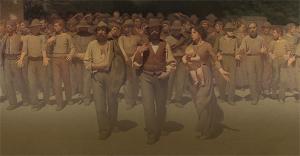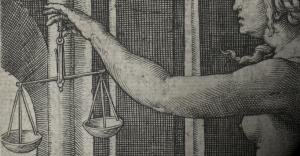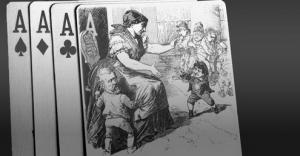Theatre and the dramatic art have been regarded in every historical period as performative instruments of social change. Through the live interaction of its protagonists within specific spatio-temporal contexts, theatre has contributed to the social transformation of both theatre makers and audiences. By applying the concept of ‘space’ to the study of theatre – one of the central cultural and economic phenomena – in the ‘long’ nineteenth century, we seek to transcend the (imaginary) boundaries that have traditionally defined theatre historiography in Central and East-Central Europe. It becomes necessary to reconsider established paradigms in historical theatre studies to reaffirm the autonomy and specificity of the discipline, and to chart new directions oriented towards an interdisciplinary setting, approaching theatre culture primarily in relation to social development.
The Habsburg Empire was a time capsule of European history in which different phases of state formation remained alive in the present. As a multilingual region characterised by complex cultural processes – where the construction of cultural identities of various national and ethnic groups occurred within the same area, or even the same town – the Habsburg Empire offers a rich repository of sources for identifying the key features of the transformation of society occurring in and through the theatre. Such a perspective allows us to understand the performative role of theatre not only in the ‘centres’ (metropolises) but also on the ‘periphery’ (provinces).
The individual contributions in this issue approach the central theme from political, economic, institutional, and sociological perspectives, with the authors investigating previously unexplored aspects of theatre culture. At the same time, they use innovative theoretical processes to interpret familiar objects. Our aim is to outline new directions in cultural historiography within the region – approaches that may enhance the potential for comparative analysis with other European developments.
Issues
Theatre as a Venue and Tool of Social Change in the “Long” 19th Century
Antifeminist Discourses in East-Central Europe from the 19th Century to 1945
The recent rise in misogynistic and anti-feminist rhetoric in public discourses—considerably amplified by digital media—might suggest that antifeminism is a contemporary phenomenon. In fact, anti-feminist narratives gained visibility as early as the late 18th century, emerging in response to emancipatory demands by women inspired by the French Revolution, and later in opposition to the growing influence of women’s movements.
While the history of women's emancipation movements and feminist discourses has received considerable scholarly attention, the antifeminist discourses— particularly in Central and Eastern Europe—remain insufficiently explored.
The present issue focuses on the period of first-wave feminism, especially within the Habsburg and post-Habsburg states. Contributors examine the rhetoric and strategies used to resist the push for women's rights, identify the social groups aligned with anti-feminist positions, and trace their evolution in response to changing social, political, and cultural contexts from the late 19th to the mid-20th century. The studies published here further reveal how actors of antifeminist discourses aimed to reverse changes in patriarchal structures brought by socio-economic modernization and the democratization of society, while also tracing the transfer of anti-feminist narratives and policies across Western and Eastern Europe.
Becoming Political: Facets of Political Socialization in East Central Europe
This thematic issue explores the processes of politicization and political socialization in Central and East-Central Europe from the late 19th to mid-20th centuries, a period of significant societal and political transformation. Focusing on non-elite and subaltern populations, the issue highlights the multifaceted ways individuals and groups engaged with emerging political structures and contemporary discourses. The contributions explore themes of interaction, reinterpretation, and adaptation, examining how political awareness and participation evolved under varying social, cultural, and institutional conditions. The studies investigate diverse settings, from the role of gymnastic associations in fostering national consciousness to the mobilization of women and workers through social networks and participation in organized activities. They further explore cultural tools of political engagement, such as political cabarets, and the contested narratives surrounding a factory town’s transition from capitalism to socialism. Together, these articles offer insights into the dynamic and context-specific nature of politicization in modernizing states, advancing our understanding of political socialization during this transformative period.
Medieval Society in East-Central Europe in the 11th to 13th Centuries
Medieval society in Europe was characterized by a clearly defined social stratification, which is best viewed as consisting of more or less closed communities united by similar political and power structure, conditions of life and hierarchies. The structure and evolution of medieval societies was influenced by a wide range of political, economic, social and cultural factors, often determined by rulers or other secular and ecclesiastical holders of power. One of the secondary objectives of this journal issue is to describe the structure of medieval societies in East-Central European monarchies and dominions and the investigation of coexistence, interaction and confrontation between different categories of the population. These topics still hold research potential due to a lack of recent studies on medieval society, which would re-evaluate older nationally or in other way biased perspectives within the context of contemporary East-Central European medieval studies. When researching the development, changes, disappearance and emergence of new legal/social categories of people and communities in medieval society in the future, it will be necessary to take into account a broader historical scope, spanning from the 9th to the 13th century.
Rethinking Intellectual History: Capitalising on Eclecticism
Intellectual history has gradually found its way into East-Central European historiography. This issue is dedicated to broadening the scope and objects of research traditionally focused on by recognizing the importance of actors’ motivations and the intellectual paths of their ideas. Moving beyond attempts to place the region of East-Central Europe on the ideational map, historians associated with the fields of intellectual history, history of ideas, and history of political and social thought, gathered in this issue, continue to explore the ideas of specific actors from the 19th century to the post-1989 frameworks. Thus, the presented issue aims not to focus on particular personalities or periods of time but rather praises both the richness and importance of thought conducted by various authors. The selected case studies delve into utopian thinking, the transformation of Catholic thought, dissident sociological concepts, neoliberalism, and revolutionary dynamics. Furthermore, each contribution underscores the intricate intertwinement with broader European, and even global, realms within which the analysed actors and their intellectual constructs gained significance, often culminating in palpable political ramifications. The aim of this issue is to engage in communication with the ongoing intellectual-historical endeavours in the respective region.
For salvation of the soul: Rituals before and after death in the Middle Ages
Being a part of everyday medieval life, death was omnipresent and perceived as an inseparable part of the world of the living. The rituals accompanying the dying person, burial, and requiem rites were not individual matters, but societal events. The main aim of this issue is to examine various aspects of pre-death and funeral rituals in the Middle Ages within the context of Central Europe. This includes expressions of solidarity between the living and the dead, preparations for the afterlife of the Hungarian nobility as revealed in preserved medieval testaments, and the donations made by nobles to church institutions. The death of relatives also imposed practical tasks on the survivors, such as burial arrangements and the exercising of inheritance rights. The funeral ceremony provided the last opportunity to demonstrate power and royal majesty. The funeral of a sovereign, similar to a royal coronation, was one of the most important rituals associated with sovereign power. Embalming and preservation techniques, known throughout medieval Europe, were employed both for practical reasons and symbolically. Epidemics, particularly the Black Death, influenced the general behavior towards the dying, which was reflected in the way they were perceived.
Criminality: Terminology and Interpretation
The current issue focuses on terminological and interpretative problems which are key to the historical study of crime in the past. While they may seem like purely theoretical questions, the answers reached provide crucial contributions to the understanding and documentation of developmental changes in the perception, assessment, sanctioning and explanation of crime in the distant past. Based on a qualitative analysis of contemporary sources from the judicial criminal practice, including the language and terminology of official and private correspondence, legislation, legal literature, and religious and political writings, the authors present crime not only as a form of social pathology, but also as an important indicator of societal change. The classifications and severity of different types offences as well as the perception of phenomena closely linked to criminality such as morality, honour, violence, social threats or public endangerment and public interest, to a large extent reflect the changing values and attitudes of society towards different behaviours. The research in this issue reveals how special conditions and the military presence in the borderlands generated new forms of criminality, the relationship of legislation to smoking and alcohol consumption, and in the case of smoking, the different justification for restrictions set according to the changing needs and priorities of society.
Intellectuals and the “National Question” in Post-1918 Central and Eastern Europe
The articles presented in this issue of Forum Historiae examine the ideas and concepts of “nation,” national existence, national history and national art in the writings of influential intellectuals active in a variety of fields—historians, literary critics, artists and art critics, and a philosopher—in Czechoslovakia, Yugoslavia, and their successor states throughout the 20th century. The cases assembled here provide an opportunity to reflect on what qualities were thought to constitute a “nation” in the minds of intellectuals within differing political climates, on the aspiring visions of “national peculiarity” and regional variants of contemplation of the “national character.” The answers to these questions could contribute to our understanding of the establishment and maintenance of communitarian relations based on social practices which are informed by nationalist history and cultural narratives. The case studies presented here offer readers a window into the intellectual’s relationship to the ruling powers and their direct efforts to legitimise or delegitimise regimes, national ideologies and policies as well as the construction of narratives detailing nation-states’ deeply historical origins and the character of national art and literature.
Networking and Trust During the Cold War
This issue of Forum Historiae is dedicated to an exploration of social and political trust and distrust, phenomena which have continually influenced the structure of social hierarchies and remained decisive factors for acceptance, exclusion and control in different types of societies and regimes. Social scientists agree that liberal democracies cannot function without trust, which takes the form of social capital, and even autocracies and dictatorships cannot be based on fear alone or promises of material wellbeing without some modicum of trust between rulers and the ruled. The studies presented in these pages focus on concerns of political and interpersonal trust—or the lack thereof—in both democratic and communist regimes dealing predominantly with the relationships between citizens and political institutions, and between institutions and their representatives. There is a distinct focus on the Cold War era, however, in some cases, continuities in developments extend beyond the given period. Authors centered their work on a discussion of the phenomenon of trust and distrust across East-West borders in the spheres of economy and cultural and scientific relationships, as well as the émigré’s circles.
Italy and Post-Habsburg Central Europe
After the First World War, the Italian goal was to ensure for the country the position of a great power in post-Habsburg Central Europe. This led to Rome’s ambitious foreign policy, which had to contend with similar aspirations by the French. However, relations between Italy and post-Habsburg Central Europe go far beyond political, diplomatic and military history. The papers in this volume also discuss the economic, cultural, local, memory and social dimensions. This thematic issue does not cover the entire matter, but is rather bringing to light topics that are not a well-known or have not been previously researched. The main emphasis has been put on the immediate after-war, but several papers extend their analyses to the whole interwar period.
Self-publishing and Building Glocal Scenes
The articles presented in this issue offer an interdisciplinary view on the history of independent publishing in both the late socialist and post-socialist periods. Different variants of do-it-yourself cultural creativity highlight the space that lies between the established high-brow and popular low-brow cultures. Specifically, the intersections between the approaches of art history, musicology, cultural studies, sociology, literary history, and media studies constitute a representative spectrum for these reconciliations. We would like to highlight the observation of all our contributors that self-published press and books bring a specific value to the building of communities or scenes that are not only locally embedded, but also interlinked globally, and show how various cultural trends were established and developed in different sociocultural and national settings. Our cases show that the socialist and post-socialist contexts enabled interesting shifts in the economic and social positioning of self-publishing activities.
Fanzines in Historical and Interdisciplinary Perspective
The issue presents a discussion about fanzines in the specific historical context of Central and Eastern Europe (CEE), where zines have not yet been a subject of focused scholarly research. Alternative subculture scenes have played a significant role in the transformation of CEE societies in past four decades, and their impact can be seen in the political and cultural debates of societies at large. Alternative narratives that were presented on the pages of fanzines represent an important source for the social history studies of the late socialism and post-socialism periods in Czechoslovakia and its successor states, the Czech and Slovak Republics.
The authors of the nine articles propose various interdisciplinary approaches to fanzine studies and analyses (media studies, political science, human geography, literary history, cultural studies and history) and demonstrate how different methodologies can contribute to our knowledge of independent publishing and alternative cultures in general.
Loyal and Disloyal to the King
The medieval concept of fidelity to the king, which meant loyalty as well as obedience, formed the basis of personal hierarchical relationships between him and his people in the Middle Ages. The tendencies of rulers to reward loyalty and punish those, who were disloyal, were common and frequent. This loyalty to the king was important for the political order and preservation of the power of the sovereign as well as his closest people. This issue of Forum Historiae has focused on topics connected to fidelity in historical texts and in practical use in the era before the year 1300. The musings on the period views on fidelity with examples from the Kingdom of Hungary; an analysis of Cosmas’ Chronica Boemorum work with the category of fidelity; views of the early medieval juridical norms, and the exile as common punishment for acts of treason and infidelity in the Moravian principality in the 9th century; an examination of the assemblies of the freemen during the same period and in the 12th century; a question of tithes awarded by king in the 11th century; consideration of the current research on the notion, idea and perception of dynasties in medieval Europe; as well as the expulsions of German kings in the 5th and 6th century, are all, among others, to be found in the studies published here.
Slovak Autonomy 1938 – 1939: The Initial Phase of the Holocaust and Persecution
During the seemingly short existence of the autonomous Slovakia at the turn of 1938/1939, the political situation drastically changed. Almost six months after the adoption of the Munich Agreement, the system of parliamentary democracy within the first Czechoslovak Republic was disrupted, while as little as three months was enough for the political representatives of Hlinka’s Slovak People’s Party (HSĽS) to take material measures in Slovakia. This period of turbulent political changes that led to single party government went hand in hand with the gradual removal of potential opponents of the regime. However, persecution and the holocaust that peaked within the Slovak State (1939–1945) began as early as the autumn of 1938. The articles in the latest volume of Forum Historiae are centred around this aspect of the newly emerging regime of the HSĽS, revealing aspects of the prologue to the Holocaust in Slovakia which until now have been quite unknown, along with the increase in collaboration with the representatives of Nazi Germany, the situation of Austrian refugees in the territory of Czechoslovakia and the legal basis for the persecution or changes in the position of women during the autonomous Slovakia.
Exiting Wars: From Napoleonic Wars to World War II
In recent years, historians have increasingly come to question the declaration of armistice a decisive line which divides a state of war from a state of peace. Countries have often mobilised their full potential and all possible options, produced propaganda and celebrated heroes all in order to defeat the enemy; families lost their fathers, sons, husbands or brothers; many soldiers returned home crippled, etc. Such processes and events cannot simply be stopped, or forgotten by signing a ceasefire, although the overwhelming majority of the population waited for this to happen. A state of war does not end through a ceasefire, from a legal or military point of view. The concept of exiting the war (sortie de guerre) shall handle this complicated process, which has its own duration and logic. In the current issue of Forum Historiae, historians from the Visegrad Four countries and France apply it to the greatest military conflicts of the 19th and 20th centuries, those being the Napoleonic Wars and the two World Wars.
Elite in Slovakia in the 19th and 20th centuries
The traditional view of regime change departs from the assumption that profound political ruptures brought about vast changes in the distribution of power. According to this view regime change is in general defined by personal, cultural and social discontinuities that dramatically impact the development of societies. In 1990, the historian, Ľubomír Lipták, published an inspiring account where he looked for an answer to the question of whether Slovakia was indeed a county in which each generation had its "hands severed" by drastic changes in the political, economic, social and cultural realities. He proposed that Slovak history in the 19th and 20th centuries was defined by deep ruptures and discontinuities: each new generation had arrived and worked, developed, assumed positions, built careers, but before the elite could mature and fully develop its potential, they were swept away and replaced by new elite as a result of political, economic or social changes. The present issue of Forum Historiae is one of the outputs of the project "Continuity and Discontinuity of Political and Social Elites in Slovakia in the 19th and 20th Centuries" supported by the Slovak Research and Development Agency. One of the principal research objectives of the project was the validation or rejection of the "severed hands" thesis, as well as other long-accepted beliefs concerning the functional and power elites in 19th and 20th century Slovakia that have not yet been supported by empirical research and analyses.
Local Roots – European Connections. The Position of Nazarene Art in 19th-Century Europe
The art of the early 19th century and especially the question of its directions after the year 1800 has repeatedly been the subject of attention of art historians in recent decades. The conventional image of the 19th century as a century of varying historicist styles, insisting on academic rules, sentimental and/or heroic religious and historic imagery and bourgeois taste seems to have more to it than just being a prelude to the modernism that emerged. In Central European visual arts, the question of transition from the late 18th century into the modern era is related to the study of a series of long undervalued artists whose names have (now) either almost vanished or were dismissed (in the past). An example of this are Johann Friedrich Overbeck (1789 – 1869) and his followers – Nazarenes – also known as monk-artists. This issue of Forum Historiae, first entirely in English, is devoted to studies which examine European Nazarenism and role of Joseph Führich (1800 – 1876) in it, from various points of views and perspectives, taking into account the autonomous reception of Nazarenism in different countries, but also the unifying role of the model images produced by key Nazarene artists.
Landscape, Nature and Environment in the Past
Historiographies in general pay rather little attention to the space within which the events of human history unfolded. It is evident that the interconnectedness and mutual interactions between political, economic, and social phenomena with the environment constitute a factor that often influenced the lives of people more than anything else. The environmental aspects of human history have been studied quite intensively within the specialized discipline of the environmental history for couple of decades now. Though for the time being this field is lacking the sufficient institutional and organizational backing in Slovakia, environmental history research is gradually developing within the Slovak historiography in the past few years as well. The present issue of Forum Historiae offers ten studies that analyse the relationship of humans to the nature, impact of the industrialisation on the environment, natural parks as specimens of an "ideal landscape", and building of road systems and their impact on the landscape and environment in the territory of Slovakia and East Central Europe in the period between the 18th and 20th centuries.
Standards of Living, Housing and Urban Planning in the City during the 19th and 20th Century
During the long course of the 19th century, cities overcame significant changes in their urbanistic development, construction of technical infrastructure and improving the housing quality. This process accelerated at the turn of the 19th and the 20th century and in the case of cities in the territory of today's Slovakia, especially after the creation of Czechoslovakia (1918). The emphasis during this evolution was on improving the quality of life in a city including development in areas such as technical and transportation infrastructure, modern building methods and architecture, or public hygiene and healthcare. However, it also included the culture of living, ways of spending leisure time, and relationship to the surrounding nature. In general, the process of the modernization of a city was neither balanced nor continuous. It was influenced by frequent changes in political regimes, with a significant change in models of urbanism and culture after 1918. The authors of this issue of Forum Historiae characterize the changes of the "city in Slovakia" using examples, especially the ones of Prešporok/Bratislava, Košice, Prešov and Žilina.
(De)formation of Rural Areas in the Collectivization Process
At the end of the 1940s and beginning of the 1950s, all the countries under Soviet influence set about transforming their countryside and agriculture in a Soviet style. Its forcible application in Czechoslovakia went hand in hand with mass persecution of peasants and their families. The representatives of the ruling regime argued for their arrogant action by a ‘higher law'; however, its main aim was an effort to subordinate the whole society, in which there was no space for independently farming peasants. Collective organizations of production, in Czechoslovakia called agricultural cooperatives, became the vehicle of such ‘reconstruction'. The aim of the recent issue of Forum Historiae is to focus on political, economic as well as social dimension of collectivization as a phenomenon of economic history, which impacted and changed Slovak society among others.
Between the Social and Political Radicalism of 1918 – 1939
The means that people used to make it clear that they were feeling impoverished, marginalized, humiliated or disadvantaged in society were varied. They generally depended on the intensity of the feeling of threat and injustice, on the mentality and political culture of the affected group or class and also on the options made available to them by the ruling regime. The inter-war republic was no exception. Whether it was violent hunger riots of rural or urban "riff-raff" or cultured middle-class protests, they usually signalled where the neuralgic points of social cohesion were and where obstacles to the more harmonious society lay. On the other hand, the reactions of the state and social elite showed the extent to which society was able to cope with social problems, whether these problems pushed society forward, on the way to achieving its ideals or whether the problems brought it to an ever deeper paralysis. The Forum Historiae 2/2015 deals with the outlined aspects of the phenomenon of social and political protest.
The Paths of Secularisation in the Long 19th Century
In historiography, there are exceedingly contradictory evaluations of the "long 19th century" with regard to the development of religiosity, the relationship between the state and the churches as well as mutual relations between individual religious communities. Was it the most ecclesiastical century or did the French Revolution began an unstoppable process of retreat of religion from the "theatre" of history? Can we agree with the opinion that the 19th century brought about the onset of the second confessionalisation in Europe? Forcing religion from the public sphere and complicating its relationship with the state triggered more vigorous activity from the religious elite, the innovation of pastoral forms, the use of new media and a relatively successful restoration of ecclesiastical discipline. On the other hand, throughout this "more than one hundred years long century", while shaping the collective as well as personal identity, a relativisation of the confessional principle at the expense of the ethnic or civil state occurred.
Power and State in Medieval Europe
An emphasis on the variety of a status of the power was a common feature of medieval political thinking. However, this fact has been sometimes overlooked. Therefore, how was the power being exercised in the Early Middle Ages? How were the political entities organised? Can we really consider these as unified kingdoms and principalities? Is it correct to perceive them in the same manner as modern states? The studies published in this issue of Forum Historiae are attempting to address such questions. Our aim is to join a discourse concerning the political entities functioning, power manifestations and a position of the sovereign in the Middle Ages. Such a discourse has been ongoing within the West European medieval studies for a long time and has also been still more and more frequently approached by historians of the neighbouring countries. Besides, the objective is to fill a gap within the Slovak medieval studies which seldom address the topics presented in this issue.
Ideology within Space and Time
The word "ideology" is a victim of its own popularity. After more than two centuries of its presence within discourse, its content and limits have been blurred. It has many academic definitions and even more forms of use within ordinary language. Despite this, ideology has a meaningful place within science – as a conceptual tool as well as a subject of research. It is important to enquire about ideology and to look for it in various fields of knowledge and actions. Even if ideology often likes being in disguise or hidden, it can be identified as an influential part of various discourses – not only within the sphere of politics, but also in science, art, urbanism or even tourism. The current issue of Forum Historiae attempts to approach this problem from a historical perspective.
Slovak Political Thinking 1848 - 1914
A topic of the political thinking within the Slovak national movement in 1848 – 1914 has been recently one of those rather marginal ones within the Slovak historiography. However, we believe this topic offers a very good research and interpretative potential. Therefore it was been chosen as a topic of this issue. We have prepared seven academic studies (as well as two reviews) which analyse particular political or national-ideological conceptions and phenomena from various points of view. Texts are bringing several original approaches as well as new interpretations, therefore we believe that the broader academic public will find them interesting. The texts aim to become an impulse for a new research of this intriguing and often neglected topic.
How To Speak About Communism?
Despite a daring title, our ambitions are rather modest. We offer neither a synthetic nor systemised view on "Communism." Quite the contrary – since this topic is extremely extensive, we have decided to publish papers that offer some perspectives for further research and discussion about this current issue. As one of the authors has stated, the aim is rather to "start the ball rolling." One of the reasons for compiling this issue has been the fact that both the far-left and the communist movement have ended up on th emargin of academic interest, while the topic of "communism" is still a significant subject as far as public discourse is concerned. A new generation of scholars who deal with this topic have grown up in the last few years. They are bringing a reflection which also offers other possibilities and methods of work than those we have been used to in the current dominating traditional historiography.
Ethnic Stereotypes In Historical Research
Ethnic stereotypes are often a tool of political manipulation and they serve as a means of escalating ethnic tensions. They represent schematic images not only of ethnic groups and nations but also of members of the same nation. They can assist in influencing public opinion as well as in creating a sense of togetherness – thanks to emotions they are able to trigger. For example, a dishonouring caricature from 1882 depicts nations of the former Kingdom of Hungary disapprovingly grumbling "We are not going!" to an appeal from their Hungarian homeland – a mother offering her arms. The caricature also does not spare Hungarian Kóbi, shown holding his mother´s skirt. It reflects the complicated situation of the Jewish population in the Austro-Hungarian Empire as well. A figure on the right depicts the leader of the anti-Semitic party G. Istóczy exclaiming that the mother should not accept "that Jordan bastard." Historical research of mutual ethnic (as well as other) stereotypes reveals their unrealistic nature as well as the functions they are supposed to fulfill and an importance they possessed during the period of nationalism. We believe that this issue of Forum Historiae will contribute not only to better understanding them but also to overcoming them.
Transformations of the Family in the History of the Kingdom of Hungary and Slovakia
The family represents an important social phenomenon that opens many interesting questions. Its research is also interesting for historians who study for example a number of family members, family structure, marriage rate, marriage strategies, relationships between individual relatives, depictions of the family in artistic as well as literary works, etc. However, the search for answers is often more complicated due to fragmentary or completely missing relevant historical sources. Therefore, a historian must often be satisfied with probes and hypotheses which can then be some basis for formulations of general conclusions. Many interesting aspects were discussed in detail at the conference "A Phenomenon of the Family in the Past of Slovakia" which took place in Bardejov. Except for new data on the topic, many thought-provoking ideas for future research were presented there. Studies and materials published in this issue draw on genealogical, demographic and historical-legal, as well as art-historical and literary-historical, research. The research period starts with the Middle Ages and continues up to the beginning of the 20th century. The issue aims to point out options, methods and questions as well as problems of further research.
Corruption
There are some topic which make historians wonder, though they have not approached these topics yet. There are problems which attack people literally every day and so they look for an answer on "where has this come from?" but search for this answers in libraries in vain. Corruption is one of such issues. Many historians abroad are engaged in a research of the corruption while only colleagues from related social sciences have dealt with this topic in Slovakia up to now. Therefore this issue consists of articles written by authors who have researched not only specific forms and manifestations of corruption but also changes of concepts of "corruption" which were conditioned both culturally and politically. Area of the present-day Slovakia is an interesting example for studying how the "arenas" of the practice of corruption were changing and how legal norms and moral rules were developing depending on social structure, economical systems and political regimes. It is also a good example to see how land reforms, arization, privatization and other massive shifts of properties marked sensitivity of a corruption perception. While reading this issue, a reader may follow both continuity and discontinuity in the practices of corrupt behaviour. One may even discover surprising similarities between corrupted clerks of the Emperor Joseph II, corruption scandals from the beginning of the 20th century and current reality.
Institutional Preconditions of a Science Development in Slovakia after 1918
Scholar activities within the Slovak national-scientific society before 1918 are often characterized as amateurish and rather enthusiastic. This evaluation is quite right while one of main reasons is to be seen in an absence of any institutional background, inevitable for professionalization as well as specialization of individual scientific activities of the Slovak intellectual elite. The year 1918, when Slovakia constituted as an administrative unit within a new state, is an essential political milestone which was quite naturally reflected also as far as the Slovak science history is concerned. This issue of Forum Historiae aims to offer an analysis of institutional preconditions of a development of the science in Slovakia after 1918, particularly from yet unresearched or less known aspects.
Nobility in Medieval and Modern Kingdom of Hungary
A so-called "academic" History of Slovakia (first volume published in 1986) dedicated only several pages to a topic of nobility. Only the briefest data were provided and even these were obviously influenced by a class perception of the history which significantly misinterpreted
Tzv. „akademické" Dejiny Slovenska, ktorých prvý diel vyšiel roku 1986, venujú šľachte len the reality. This short, or even superficial image fully accepting requirements of contemporary ideology, did not emerge as a result of a proper and systematic research. To put it simply – the nobility was not a "modern" or "fashionable" topic to deal with at that time, therefore some foreign patterns (especially those ideological ones) had been assumed. Partially, positivistic as well as romantic attitudes of some older authors have been taken over and subsequently, such findings were filtered that they fit in a previously established concept. This situation has essentially changed since the 1990s. Researches turned their attention also to the topic of the nobility. Questions of its origin, contemporary status, differentiations, tasks, relations or even its everyday life have been addressed. The most recent findings concerning noble population and their life in the Middle Ages and Early Modern Period are presented in this issue of Forum Historiae.
Democracy, Society and Politics in Interwar Slovakia
A journey from declaring principles of democracy to their real fulfillment in a society is a long-distance run. To evaluate its success or failure can be possible only after decades or even a longer time. Interwar Czechoslovakia, called "the island of democracy", was with its twenty years long existence an inspirational example of such a journey. In comparison with its neighbours, Czechoslovakia indeed was the island of democracy. However, application of democratic as well as republican ideas in a life of the society ran into problems as any other creative effort due to various internal as well as international political causes. If we divide an extensive topic of a relationship between democracy-society-politics, we can encounter some partial questions. How were Slovak citizens getting used to the regime of parliamentary democracy and to establishing of a civil society? What was signaled by significant changes in autumn 1938 as far as the state of democracy was concerned? A current issue of Forum Historiae brings incentives for reflecting these and also other questions connected with the selected topic.
Historical Narrative, Ideology and Historiography
What is a subject of a historical text? How are results of historiographical research presented? What does such research actually refer to? Theoreticians of history have been looking for answers to these questions, while historians themselves (at least within the context of Slovak institutionalised historiography) have ignored them. One of the most visible consequences of this absence of a theoretical reflection is a recycling of deep-rooted stereotypes, as well as a natural application of terms and schemes which often have questionable or unsustainable content from an analytical point of view. If we want to eliminate the production of historical knowledge of this type, historians´ theoretical reflection on the nature of this discipline is essential. This issue of Forum Historiae claims the same objective. It presents seven studies and three reviews which variously analyse the implications of a narrative form and ideological preconditions of historical texts for the nature of historical knowledge.
Family at War
War is not an exclusively political or military phenomenon, though these have been its aspects traditionally approached by historical research. It is distinctive of the great wars of the 20th century that they influenced all spheres of the life of society. As a result, the focus of historians´ interest has shifted from military-diplomatic and political-economic background to a broader social and cultural field in the last decades. The everyday life of "ordinary people" in and after the war, including the impacts of the war on a key institution of social life – the family – represents a specific challenge for current historiography. Authors have attempted to capture changes in strategies for the survival of individuals, families and communities in an extraordinary war and post-war situation. The published papers represent proceedings from the international conference "Family at War: Strategies of Survival and their Limits in War and Post-War Conditions" which took place at the end of 2008.
Towns and Nobility, Burghers and Nobles
Slovak historiography has dedicated appropriate attention to the history of towns, especially to their emergence, legal status, administration and economy, since the 1960s. However, the person of a burgher, town founder or inhabitant, an events mover, has been somewhat neglected along these issues. Nobility as a separate subject did not appear as a focus of attention. As far as towns were concerned, nobles were perceived as a retarding element of their development. However, new researches have widened the scope of findings concerning nobility and towns and has offered a much more varied and wide-ranging image of their coexistence, their cooperation as well as conflicts, in their full complexity. These studies and articles represent written versions of papers presented at the conference "Towns and Nobility, Burghers and Nobles". Their content is focused specifically on the above mentioned aspects of the coexistence of towns, burghers and nobility.
Variations Between Memory and History
The relationship between history and memory is an enticing topic for discussion. These two phenomena are often interconnected but also confused. In some cases, there are no qualitative differences between the reminiscences of contemporaries and the results of a historical analysis. However, these phenomena can be significantly different, though both can be very acceptable to society. This year's first issue of Forum Historiae presents studies which deal with the relationship between historiography and memory from various perspectives. In the section "Materials," we offer two reviews and an older text from an important Slovak historian, Daniel Rapant. A discussion on extensive questions which were in the previous issue continues in this one too. A portal section of Forum Historiae has been supplemented with publications which can be downloaded free of charge as well as with information concerning upcoming events.
The History of Slovakia on the Threshold of the Third Millenium
Historian Dušan Kováč has labeled the history of Slovak historiography as the "Cinderella" of professional historical science in this country. This comparison was aimed at bringing attention to the unpleasant condition of Slovak historical science in regard to the history of its own discipline. He particularly highlighted the inheritance of two totalitarian systems which negatively influenced the development of this science in the 20th century. However, the situation is gradually getting better. This can be attested to, for instance, by some works which have been published in the last years and have addressed the issue of the history of lovak historiography. The pilot issue of Forum Historiae approaches this key issue of our field.





































